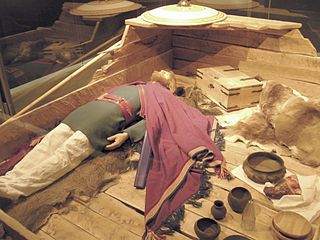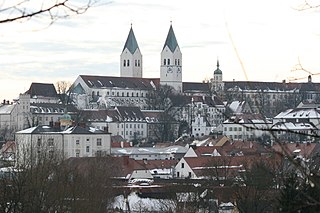
The Baiuvarii or Bavarians were a Germanic people. Their name probably means "men from Bohemia". The Baiuvarii had settled modern-day Bavaria, which is named after them, by the early 5th century AD. Through their ruling Agilolfings dynasty, they were closely connected with the Franks. The Baiuvarii were speakers of an early form of the Bavarian language, and are considered the ancestors of the Bavarians.

The Ottonian dynasty was a Saxon dynasty of German monarchs (919–1024), named after three of its kings and Holy Roman Emperors named Otto, especially its first Emperor Otto I. It is also known as the Saxon dynasty after the family's origin in the German stem duchy of Saxony. The family itself is also sometimes known as the Liudolfings, after its earliest known member Count Liudolf and one of its primary leading-names. The Ottonian rulers were successors of the Germanic king Conrad I who was the only Germanic king to rule in East Francia after the Carolingian dynasty and before this dynasty.

Otto of Freising was a German churchman and chronicler. He was Otto I Bishop of Freising as from 1138.

Freising is a town in Bavaria, Germany, and the capital of the Freising Landkreis (district), with a population of about 50,000.

Bavarians are an ethnographic group of Germans of the Bavaria region, a state within Germany. The group's dialect or speech is known as the Bavarian language, native to Altbayern, roughly the territory of the Electorate of Bavaria in the 17th century.
The German name of Austria, Österreich, derives from the Old High German word Ostarrîchi "eastern realm", recorded in the so-called Ostarrîchi Document of 996, applied to the Margraviate of Austria, a march, or borderland, of the Duchy of Bavaria created in 976. The name is seemingly comparable to Austrasia, the early middle age term for the "eastern lands" of Francia, as known from the written records.

The Duchy of Bavaria was a frontier region in the southeastern part of the Merovingian kingdom from the sixth through the eighth century. It was settled by Bavarian tribes and ruled by dukes (duces) under Frankish overlordship. A new duchy was created from this area during the decline of the Carolingian Empire in the late ninth century. It became one of the stem duchies of the East Frankish realm which evolved as the Kingdom of Germany and the Holy Roman Empire.

East Francia or the Kingdom of the East Franks was a precursor of the Holy Roman Empire. A successor state of Charlemagne's empire, it was ruled by the Carolingian dynasty until 911. It was created through the Treaty of Verdun (843) which divided the former empire into three kingdoms.

Tegernsee Abbey is a former Benedictine monastery in the town and district of Tegernsee in Bavaria. Both the abbey and the town that grew up around it, are named after the Tegernsee, the lake on the shores of which they are located. The name is from the Old High German tegarin seo, meaning great lake.

Arbeoof Freising was an early medieval author and Bishop of Freising from 764.
Scharnitz Abbey was a Benedictine monastery in Mittenwald in Bavaria, Germany.

Benediktbeuern Abbey is a monastery of the Salesians of Don Bosco, originally a monastery of the Benedictine Order, in Benediktbeuern in Bavaria, near the Kochelsee, 64 km south-south-west of Munich. It is the home of the Songs from Beuern, i.e., the famous Carmina Burana.

St. Peter's Abbey on the Madron was a Benedictine monastery in Flintsbach am Inn in Bavaria, Germany. The church, now a pilgrimage church known as the Peterskirchlein, still stands on the site.

The Catholic Church in Germany or Roman-Catholic Church in Germany is part of the worldwide Catholic Church in communion with the Pope, assisted by the Roman Curia, and with the German bishops. The current "speaker" of the episcopal conference is Cardinal Reinhard Marx, metropolitan Archbishop of the Archdiocese of Munich and Freising. It is divided into 27 dioceses, 7 of them with the rank of metropolitan sees. All the archbishops and bishops are members of the Conference of German Bishops. Due to a church tax compulsory for those who register civilly as Catholics, it is the wealthiest part of the Catholic Church in Europe.

Theodo also known as Theodo V and Theodo II, was the Duke of Bavaria from 670 or, more probably, 680 to his death. It is with Theodo that the well-sourced history of Bavaria begins. He strengthened his duchy internally and externally and, according to the medieval chronicler Arbeo of Freising, he was a prince of great power whose fame extended beyond his borders.

The Lex Baiuvariorum was a collection of the tribal laws of the Bavarii of the sixth through eighth centuries. The first compilation was edited by Eberswind, first abbot of Niederaltaich, in 741 or 743. Duke Odilo, founder supplemented the code around 748. It is one of the most well documented bodies of Germanic tribal law.
The Aribonids were a noble family of probably Bavarian origin who rose to preeminence in the Carolingian March of Pannonia and the later Margraviate of Austria in the late ninth and early tenth centuries. The dynasty is named after its ancestor Margrave Aribo of Austria. The Aribonids maintained influence in the Duchy of Bavaria, the Austrian march, and other parts of Germany until the early twelfth century, when they disappear.

Saint Nonnosus, also Nonosius, was a prior at the San Silvestre monastery on Monte Soratte north of Rome and later a monk at Suppentonia, near Civita Castellana. He was a contemporary of Saint Benedict of Nursia. Alban Butler has written that “so little information has survived about Nonnosus that he is not especially interesting in himself.” His name does not appear in any ancient martyrology.

The Prince-Bishopric of Freising was an ecclesiastical principality of the Holy Roman Empire from 1294 until its secularisation in the early years of the 19th century.

Hitto of Freising was the sixth Bishop of Freising from December 811 to 835.
















